|

Jack-in-the-pulpit, Arisaema_atrorubens.
(*photo credit)
September 1, 2013 Cultivating the Virtue of Humility
Everyone who exalts himself shall be humbled and he who humbles himself shall be exalted. (Luke 14:1, 7-14)
In a culture where getting ahead is to spruce one's CV and polish one's medals, it is hard to be humble. Actually, humility grows when we make an effort. Here are some possible hints:
* Know your handicaps and hardships and regard them as a gift and opportunity to do something with less. St. Paul lists his handicaps as though they are part of the sufferings of Christ.
* Praise the achievements of the lowly. Focus attention on the ones who are generally overlooked. Fawning over pop stars and recognized musicians hardly cultivates humility on anyone's part. But building up those who are forgotten has a humble goal for you. Give special emphasis to the overlooked and bashful.
* Acknowledge that I am poor in so many ways and accept this as part of being human -- and be joyful by affirming solidarity with the poor of this world. Being a humble servant is being Christlike; this includes trust that the poor will rise and take what is rightfully theirs and that they are empowered by God.
* Give credit to others when this could have gone to me or a smaller intimate group of "us." Allow broader partnerships to flourish and others to receive a credit when their efforts may not have been as great as mine or some of us.
* Accept that my work is a small contribution to a massive undertaking. This I find difficult to acknowledge, and yet it is profoundly true, for in the great sweep of things what anyone does is only a minor contribution to saving our wounded Earth.
* Proclaim the value of a small contribution when done in the empowering grace of the risen Lord -- Resurrection-centered spirituality. We have to believe in the power of small tasks done with great love. In a spiritual way we are willing to risk being seen for our imperfections. We recognize our limitations and the shortness of our lives, and admit we are doing the best we can do.
* Work for a future generation even though we will not live to see the fruits of that work. Regard such work as a counter to the selfishness that sees no future after one's demise.
* Give thanks to the Lord for the opportunity to live in these trying times. In a sense of gratitude we give credit where credit is due -- to the Lord who distributes good gifts.
Prayer: Lord, our journey of life has its many knocks and barriers but you are with us through it all. We cannot achieve success on our own. Allow us to leave the counting to you.

Buckeye butterfly on late summer blooms.
(*Photo by Sally Ramsdell)
September 2, 2013 Global Unemployment: A Volatile Time Bomb
A Christian who is not a revolutionary today isn't a Christian. Pope Francis (June 17, 2013)
On Labor Day we ought to consider the condition of laborers and those who would like to be laborers but are held back by an economic/political system from acquiring an honest livelihood. Three realities (willing workers, jobs, and resources) fail to come together due to the current fiction that the status quo is quite satisfactory. In point of fact, the present situation of 300,000,000 unemployed throughout the world -- most wanting jobs to secure their livelihoods and that of their present or future families -- is a time bomb ready to explode. Free marketeers rant about productivity and ready jobs for the far-sighted provided these play the rules with their limited opportunities. They rave about clever folks who can make fortunes like those with fortunes (off of permissive tax systems that favor the rich). Unemployed: organize and take what is rightfully and collectively OURS!
These facts emerge before our eyes: first, there are potential workers currently unemployed who seek a meaningful life and ability to contribute during their life time; second, there is a plentitude of work in such areas as caregiving and rebuilding a deteriorating national, regional, and local infrastructure (roads and bridges, flood control systems, public housing, brown fields, high speed rail, airports, seaports, and canals); and third, there are financial resources in untaxed billions salted away in tax havens and held by billionaires who sequester funds from the public commons, that when taxed could be applied to useful work projects.
The interaction of workers, needed work, and work project funding is absent due to privileged wealth with excessive influence in our economy and government. The privileged pretend to be generous with their charity when they ought to be surrendering their surpluses for the common good of those desiring to work. They fail to see the dignity of work and the need to preserve the commons; they are colored by their own self-interest in retaining the ill-gotten goods and dispensing them in dribbles as they deem best as autocrats. Democracy suffers as we tolerate such views.
The Church can act as catalyst and incite laborers to rise up and exert their democratic responsibilities as true but non-violent revolutionaries. This means to put pressure on governmental leaders to free up locked-in capital that could be used for funding projects to benefit the people. Unemployment in a time of needed work and eager workers is a sin of our capitalistic system, seeking a ready pool of lower-waged people patiently standing in line for limited jobs. All workers need to show a holy impatience by insisting that government is employer of last resort -- and global security means eliminating unemployment.
Prayer: Lord, give us courage to take what is rightfully ours, to liberate burdens from the rich, and to support the common good.

Red fox, Vulpes vulpes, pauses for rest in summer heat.
(*photo credit)
September 3, 2013 Climate Change Warning Levels at 400ppm
This spring the Mauna Loa Observatory in Hawaii found carbon dioxide levels reached 400 parts per million (ppm), and extrapolated this to be the highest level in four million years. Clearly, levels that were at 320ppm 55 years ago (when the observatory started taking measurements) continue at a steady climb with no plateau or decline in sight. However, the rate of rise has grown from 0.7ppm in the 1960s to 2.1ppm now. Amid international climate treaties and agreements, global rises have not slowed down.
The seriousness of the situation is not to be dismissed by certain pundits, for over 97% of scientists agree that changes must occur. To hold to a possibly safe overall 2 degree Celsius rise (a relatively safe level) would require holding CO2 levels to 450ppm. Effects grow and linger for years and require not only unforeseen limits to grow but nearly impossible cutting of artificial CO2 rises to zero by 2075. In other words, as the window of time for taking immediate action closes, the amount of action in curbing CO2 becomes more and more difficult. A future generation will ask, "Why didn't they act when they knew what was happening?"
Part of the problem is not only that some adamantly oppose recognition of human causation, but that such opposition reduces the sense of urgency to change the status quo. And changes risk hurting the almighty bottom line of profit-making Big Energy companies that include coal and oil and frackers of shale to capture natural gas and more oil. Yes, in this age of cheap natural gas and talk of American energy independence, "fracking" sounds like a dirty word and IS. This one slightly cleaner fossil fuel allows us to pretty much live like we have in the past, except that now hundreds of millions of Asians and others are consuming and enjoying the good life with us Americans and Europeans.
In this series of Daily Reflections we return over and over to one or other aspects of the complex climate change issue. This is more than a lark or fad; it is a frightening legacy that this generation is leaving to the next -- a form of indebtedness that we forget about as we pass on. And this is not something to be proud of. Our sensible hope is that we can cut damage and ward off major disaster and, at times, these hopes seem to dim. We count on others to quickly make changes that are needed with urgency. Yes, those concerned have initiated practices that curb CO2 emissions, through recycling and acquiring energy-saving appliances and autos to planting trees and opposing tar sands oil pipelines. But are these actions enough? We now see that we must truly face
our social addiction to fossil fuels and start profound changes in the way people live their ordinary lives. We must replace material allurements with a spiritual sense of mission requiring simultaneous physical adjustments and spiritual conversion.
Prayer: Lord, teach us to see the signs of our times, and to
more than see; give us the strength to take meaningful actions.
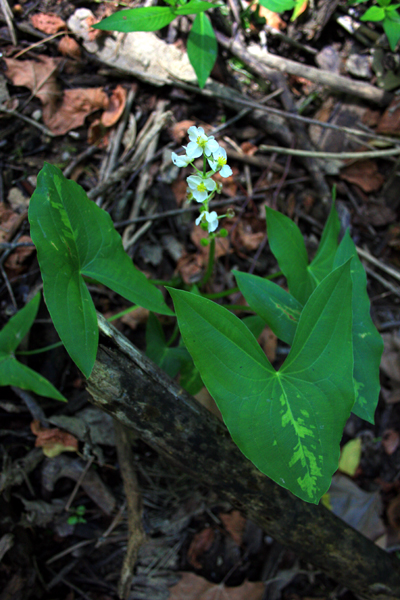
Common arrowhead, Sagittaria latifolia, Kentucky autumn bloom.
(*photo credit)
September 4, 2013 Detrimental Effects of the Throwaway Culture
Without thinking we toss away a used razor, plastic cup, or outdated electronic device. If generous and attempting to recycle, we put some discards in the recycle bin or save the device to give as a toy to a kid on our charity list.
Throwaway culture judges superficially. It finds something wrong with the old and some excuse to join those panicked to obtain the latest fads -- to purchase, substitute, and discard as though a sacred ritual. This is a materialistic economy increasing the troubles of our wounded Earth. Why hold on to what is not the best and be looked down upon by those who know? Throwing away a serviceable but substituted appliance or device has a tinge of guilt attached and so it is often put away in costly storage space.
Throwaway culture includes unneeded people. This portion of the human population has little or no utility; they are overly young, old, ill, poor, or uneducated -- and are thus subject to being overlooked or discarded in favor of the more successful and prominent ones. This compartmentalizing of human beings devalues the qualities of a person, the redemptive power of offered suffering within the spiritual economy of salvation, and of an opportunity for a community to assist each other. The discarding allows selfishness to triumph and disparity among people to grow. Large-scale discarders expect the lowly will die off and no longer be a financial burden on the affluent; out of sight, out of mind.
Throwaway culture discards tradition. That which has value from the past is of no relevance to discarders. Why bother to respect that which did not have the latest in clothes, electronics, or forms of entertainment. Past era consumers are old, pre-technical, unable to use the Internet well, and only wanting a good retirement. Why waste time learning about such trivia from the past? Current history as such is reduced to informational tips with little feeling for the ancestors' struggles to survive.
Throwaway culture forgets resource expenditures. Attitudes are related to the desire to see immediate convenience at some cost to the environment. We forget the quantity of resources to build past vehicles, housing or even cities -- and so discard them. Resources are never perfectly recycled and continued in proper use, and so it is easier to abandon them or bury them in a landfill. Little calculation is made of replacement structures and devices and accompanying pollution in processing, shipping, and distribution of these substitutes. The throwaway culture is part of an indebtedness that allows a future generation to be saddled with unpaid bills. When a few are throwaway people, the impact is light; when hundreds of millions enter this wasteful practice, results are staggering and frightening. Will it stop soon?
Prayer: Lord, prompt us to ask ourselves how we fit into this throwaway culture and what we intend to do to bring about profound change.

Autumn sneezeweed, Helenium autumnale, appropriately named.
(*photo credit)
September 5, 2013 Benefits from Local Basement Sales
Tomorrow at this parish will be a "grand basement sale," given in honor of the Benedictine Sisters from Covington who staffed the local hospital and assisted in our parish for three decades. In their spare time they spent hours gathering, sorting, and assisting with parish basement sales (really indoor and well-ordered yard sales during any season or weather conditions). The displayed materials sell for only a fraction of what new items would cost and include only donated higher quality clothes, books, cards, trinkets and kitchenware. The "grand" size of the sale refers to a larger assortment than usual and a larger crowd expected.
Virtually all local residents know our Catholic church for her basement sales, and over the past half century much of the local community has ventured there to look for bargains. The sales do the following:
* Provide some with the only good clean and quality donated clothing that, when new, would prove beyond the price range of these low-income buyers;
* Become an outlet for wealthier people or those who no longer need items that are donated (provided the practice is not an excuse to change wardrobes to the latest fashion);
* Make available bargains for those who could not normally afford to obtain gifts for relatives and friends because of their limited incomes;
* Upholds the dignity of individuals who want to purchase what they obtain and not be purely beggars;
* Prove a meeting place and opportunity for seniors who are not able to circulate, except when acquaintances feel willing to take them to this place of conviviality;
* Offer a good feeling about the Church for almost all in the community. I meet many at my local hospital during volunteer visits who know our parish through these sales and invariably smile when thinking of past visits;
* Become an outlet for those who endure an emergency need to be refurnished or reclothed in an orderly systematic fashion;
* Allow the Church to make additional income (even at a quarter or fifty cents per item) that is used for local and foreign ministries; and
* Open doors to other types of charitable support.
While basement sales are the lifeline for poorer community folks, my only hesitancy is that it may confirm some customers in the prevailing materialism of our culture. However, I believe the basement sales fit into the proper parameters listed by Robert D. Lupton in Toxic Charity: How Churches and Charities Hurt Those They Help, HarperOne, 2011. Items are not given as charity except in genuine emergencies, thus allowing local people to feel at home obtaining necessities at low but not giveaway prices. The dignity of the individual participants is preserved and genuine needs met.
Prayer: Lord, grant us the gift to assist people who are in
need but to do so in a dignified manner for the good of all.

SPECIAL REFLECTIONS September 5, 2013
Friends and Fellow Americans,
Why must our nation be drawn into another internal conflict by the merchants of war? Yes, it is morally wrong to exert American military might and shoot numerous missiles at various targets in Syria in order to "teach" the unteachable a lesson. Old-fashioned spanking won't work no matter how serious the infringement. Weapons' manufacturers are the only ones to profit. It is like attempting to heal through outdated bloodletting. Furthermore, drawing red lines and then be "honor-bound" to shoot, if we have weapons and the other side can hardly shoot back, has little honor associated. This is serious matter and demands international cooperation and new diplomatic ways to effect change. Stop playing games. Too much is at stake.
The Earthhealing Team

Gardener's blanketflower, Gaillardia aristata, late summer colors.
(*photo credit)
September 6, 2013 Let's Rid Ourselves of Clericalism
Rarely do I speak out about church-related problems, because that goes beyond our earthhealing mission. However, one issue impinges especially in our efforts to enhance the democratic process. I regard the Church as my mother and so I never speak ill of her. However, some take advantage of my mother for their own advancement and ambitions and thus we must speak up. Pope Francis speaks out forcefully against the "leprosy of careerism within Church circles" -- and that is fully within his role as chief shepherd. He says that this careerism and ambition cuts into the efforts of the Church to speak out with authority against the disparity of wealth and inexcusable poverty plaguing our world.
Clericalism distracts and draws attention away from the needs of the Church's mission to bring Christ to the world. Jesus washed the feet of the apostles to indicate the humble service demanded of each of us. The Pope sees that some sheep are being mischievous and he calls for order in the institution so that our mission in a world of need not be distracted by privileges gained through wrongful entitlement. They did not pass out medals in 1940 at the evacuation of Dunkirk. Special privileges are not needed now. Urgent and proper order involves healing a troubled world where disorder reigns supreme, and the only privilege is one of unheralded service. The curse of clericalism is that it encourages some to sit on pedestals when they should be out in the field of hard knocks. Traditional privileges segregate servants into house and field slaves and that is not proper if all must help harvest.
Clericalism is deference to rank; this is either by clergy themselves and their ranking esteem or by laity for clergy, a residue from absolute monarchical days and the three "Estates." Clericalism can be a form of excessive attention to self for it allows a privileged culture to expect special favors and then to side with the privileged who bestow them. An excessive concern about expected benefits is a subtle clericalism just as much as the Second Estate of the old French monarchy -- and then came the tragic effects of the French Revolution.
Unpopular moral teaching is not clericalism. Some would say that the Church's influence is exerted in speaking for proper public policy -- but silence could be worse. Spiritual power must speak out on issues of moral conduct. We reflect on the Sermon on the Mount (Matthew Chapter 6 and following). Name-calling that defense of proper moral conduct is an exercise of "clericalism" is untrue and can be a form of intimidation. The best argument against excessive power by Church leaders is to accept damage from speaking out and to risk losing any supposed privileged position in order that the truth must prevail. Religious freedom is a right and not a permitted privilege; this right is best exercised when clericalism is eliminated in the face of growing secularism.
Prayer: Lord, allow us all to be servants of the rest and to avoid or do away with traditional privileges of status or position.

Late summer thunderstorm.
(*photo credit)
September 7, 2013 Democratic Efforts to Combat Clericalism
When the Church does not come out of itself to evangelize it becomes self-referential and then gets sick. Pope Francis
Clericalism is a sense of privilege that is enjoyed by clergy either through their own estimation, or by leaders allied with them, or by lay people willing to give deference where it does not belong. When applied by civil leadership it often seeks approval of autocratic rule and thus demands a silent and docile Church with expected privileges. When lacking critique of its own members, clergy can be part of an illness Pope Francis calls ecclesiastical narcissism. Lay folks must not see "Clergy" as special privilege.
The three French "estates" of nobility, clergy, and general public created rigid classes within that nation. Why such groups standing in contrast or in opposition to each other? Leaders differ from ordinary citizens but in a democratic society ought to be drawn from their ranks and not through some entitlement or birth privilege. Democratic leadership of state AND church respects the elevated and cooperative efforts of all citizens and members. Spiritual empowerment comes from Christ within our midst, not from some sort of endowment of individuals. Better than to regard civic and clergy leaders as inherently different is to see that they are chosen in some manner by the people empowered by God. Leadership is a service and a ministry among the nobility of the multitudes. A better approach in contrast to aristocracy is that all people have a task of exercising citizenship; proper church ministries with responsibilities inherently associated involve all.
Recall that our first American Catholic Bishop, John Carroll, wanted to be called in the pattern of our newly elected president, "Mr. Bishop." Unfortunately, that suggestion was never acted upon for any period of time and to the detriment of all concerned. Outdated clericalism tainted by outmoded nobility harms our democratic spirit. In fact, many of the tenets of a democratic society dealing with equality are emphasized as Christ's fundamental teaching and are found in theological thought. The Church must continue to defend the democratic process and thus grow herself ever more democratic. Inherited nobility is outmoded and so is clericalism expecting entitlement. We still need presidents and bishops but not any form of kowtowing or excessive deference.
On March 19, 2012 our Daily Reflections laid down "Democratic Principles and the Church." Laypeople must take responsibility as part of "We the Church," especially when working as the principle of subsidiarity indicates, doing as much as possible at lower levels of structure. Don't put saints on distant pedestals, but as models among the people; glory is within the ranks of people; a priest's role is essential with regards to certain sacred functions, but so are others such as health care and teaching.
Prayer: Lord, help us to avoid unnecessary privilege so we can be of greater service to the people of God.
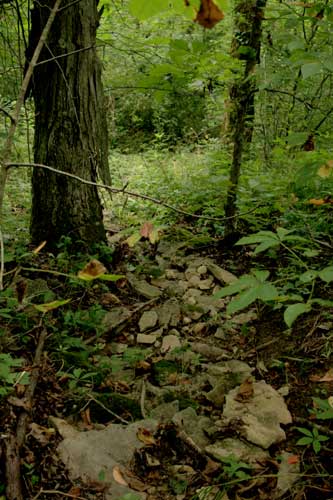
Late summer forest floor, with littering of leaves.
(*photo credit)
September 8, 2013 Releasing the Death Grip on Possessions
None of you can be my disciple unless he gives up all his possessions. (Luke 14:33)
This quotation is a tall order. We all know Christians who have possessions and who struggle to keep them intact. But what does it all mean, for private holdings seem part of our everyday life such as house, car, lawn, investments, and titles? The issue is how much we hold, how hard we hold to possessions, and how reluctant we are to let go of them. Pity those who hold much, hold firmly, and find it hard to let go. Thomas Jefferson's fine furnishings at Monticello along with the place were auctioned soon after his death to pay debts incurred through unchecked spending. (Alan Pell Crawford, Twilight at Monticello, Random House, 2008).
If the heart is bound to the holdings, then a terrible shock is in store when the day of giving up arrives -- as it must for everyone. Jesus likens possessions to the building of the structure, preparing the site and manner of construction so it can withstand storms. Today this lesson is needed for Atlantic Ocean-front owners expecting public money when inevitable hurricanes raise havoc. Holding on to wealth, grandeur, and security in material things is a facade that is passing. Proper planning and understanding of risks is needed. We accept our limitations and find that what is held firmly is in trust to serve the common good within a democratic society. Why should individuals have a "right" to hold on to billions and say how these funds are dispensed? As Christians we make possessions short-lived responsibilities that ultimately are decided by the people.
Besides quantity, we are fully aware that some possessors are poor folks who hold tightly to the little they have. In fact, they take more energy in the grip than do some who are termed wealthy. How do we get them to see how futile holding on is, for it will soon be released when the death grip slackens in the tomb? Grasping for goods takes efforts and enhances lack of sharing with those who must acquire their necessities. Inattention to needs of others is critical. The death grip is a desperate effort to go against growth in love and sharing with neighbor, and runs counter to Jesus call for us to serve others.
When some generous souls are near death's door, they decide to let go of possessions and enjoy the act of doing so. They have practiced good stewardship with God-given gifts that they release in a spirit of generosity. Materialism has not contaminated their grace to love and share. We find their generosity a gift of a valuable lesson about possessions, a lesson needed by all, especially youth given all that they wanted. What a horrible legacy, to be permitted to be death grippers of possessions.
Prayer: Lord, teach us to know how much to accept and retain, and how we are to be people who are willing to let go of
possessions for the sake of all -- and our own salvation.

Emergence of cultivated shiitake mushrooms.
(*photo credit)
September 9, 2013 The Subtle Art of Gleaning
When you gather the harvest of your land, you are not to harvest to the very end of the field. You are not to gather the gleanings of the harvest. You are to neither strip your vine bare, nor to collect the fruit that has fallen in your vineyard. You are to leave them for the poor and the stranger. (Leviticus 19: 9-10)
Gleaning in its primary meaning pertains to collecting after the reapers have gathered in the harvest, and in a sense is a simple way of sharing with the lowly. During this harvest season let's reflect on the nobility of honest gleaners. They are certainly not jackals and vultures picking after lions have their fill. While gleaning is not generally regarded as something noble, still there is a good characteristic in the provision of the harvester for the poor (a largesse) and in the noble gleaning as performed by Ruth (an ancestor of Jesus) in the Scriptures.
Gleaning can take subtle forms; it can be more urban and involve the gleaner's livelihood as a rag-picker or beggar. Really, any resource recycler who takes from another's surplus is gleaning the economic leftovers. Beggars can be quite skillful and even highly successful. Some people are more professional in knowing how to be at the right place and time; they can take advantage of harvesters and their sense of charity. However, there is resourceful skill in recognizing gleanable surpluses and in taking the effort to acquire through such takings -- as wild geese which follow combines and mechanical harvesters today. Some of the resourceful follow the heavy spenders but do not critique them.
Gleaning can be foraging for urgently needed food such as during the Great Depression or in wars. Gleaning can be foraging or even stealing under another name. One Civil War Confederate soldier tells of foraging as a necessity for his supply-short cavalry corps; in Unionist eastern Tennessee in 1864 towards the end of that horrible war, the foraging parties forced residents to give from a limited store of food on which a family had to survive -- commenting years later that his gun spoke louder than the poor family's prayers. It apparently haunted this veteran a half century later in his memoirs. Excessive gleaning is as faulty as harvesting every bit, and foraging fits that category.
Gleaning can have an ecological character. Renewable energy seekers can glean the wind, sun, geothermal heat, tides, waste dumps, and free-flowing rivers. A more concrete case is that of "gleaning" from spent cooking oil or agricultural wastes to make biofuels. Recycling and reuse of materials are forms of gleaning as are yard and other second hand sales and energy efficiency measures. Here gleaning is not allowing resources to go to waste, for gleaning has far more possibilities than mere grain fields.
Prayer: Lord, teach us the art of correct gleaning and to see that it is a resource-conserving practice worthy of our complete attention and support.
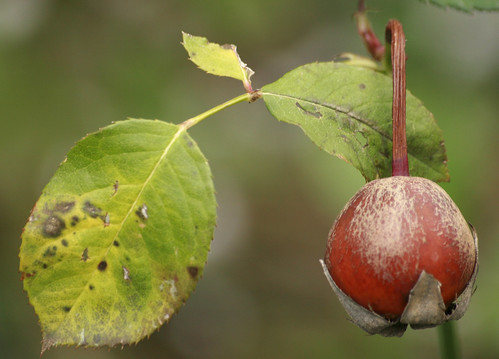
Ripening fruit of the American persimmon, Diospyros virginiana.
(*photo credit)
September 10, 2013 Curb the Weapons Trade through Real Offsetting
In the councils of government, we must guard against the acquisition of unwarranted influence, whether sought or unsought, by the military-industrial complex. The potential for the disastrous rise of misplaced power exists and will persist.
President Dwight D. Eisenhower, 1961 Farewell Address
On Swap Ideas Day we could suggest practical ways of making life easier, but why waste time and communication opportunities on individual practices alone? A sound national and global policy of reduction of the booming arms trade would be far more practical in the long run. In the early nineteenth century, ideas were swapped about curbing trade in human slaves -- and it grew rapidly in popularity when people realized the injustice and they pressured to cease the practice -- and it stopped. Today we must curb trade in modern inhuman slaves, which is sophisticated weaponry.
Currently, in this country and among the major weapons' producers, military contractors sweeten their bids for the booming sales of weaponry through development of local technical projects -- a form of kickbacks and "offsets" that economists call distorted and which is even banned by the World Trade Organization. ("Guns and Sugar, The Economist, May 25, 2013, pp. 63-65). The trillion and a half global military structures (half American) and the booming manufacturing and exporting businesses must be cut to size, for we should never forget President Eisenhower's wise words as he left public office.
A military/industrial complex has become a reality and is a tail that wags the dog. This movement of weaponry of enormous power and killing capacity haunts our peace-seeking world. The arms trade grows through these enticements (or bribes) that include economic offsets for targeted leaders of nations with loads of oil money and willingness to spend -- and private contractors taking advantage of these imprudent people. In times of drone strikes and cyber wars isn't it time to become realistic about the weapon's trade? One answer is to offset such temptation to military trade with peacetime infrastructure improvement, primarily at home where taxpayer support is popular. But let's not omit foreign needs.
As currently conceived, the vast American military-industrial complex weakens global security when weapons are made and exported that create a heightened arms race. This feeds on misguided taxpayer willingness to support strong U.S. military global presence. America's military advocates promote pet "Star Wars" programs, aircraft carriers, and stealth bombers costing billions, which add little genuine global security. Tanks and heavy equipment consume two to three gallons of precious fuel per mile and military aircraft are major users of petroleum-based fuel. Where is resource conservation? True "offsetting" and real security call for improved health and infrastructural buildup.
Prayer: Lord, teach us to dare to put our house into order.

Bridge over the Carp River. Hiawatha National Forest, MI.
(*photo credit)
September 11, 2013 Federal Lands Day and Care For Creation
Are we truly cultivating and protecting creation? We are losing the attitude of wonder, of contemplation, of listening to creation. Pope Francis, June 5, 2013
Caring for creation is part of being responsible before God for all the good things done. Certainly it involves individual responsibility in our everyday activities; but it also involves larger issues and how we as citizens must react to fracking, or tar-sands-oil transport, or nuclear waste disposal. Some of these issues affect lands and some affect our public land trust.
Our federal lands are our collective American commons somewhat similar to what we have as family or community parks or state forests. The federal lands are numerous and would occupy space merely listing detailed categories of recreational parks, national forests, wilderness areas, shrines and battle sites, military reservations and bases, Interstate networks, federal buildings, cemeteries, river levees, and others. In fact, almost half of the U.S. land surface is federally-owned lands. There's little pressure to release public ownership but much by private groups to capture profitable resources on those lands through leases and subterfuges. In essence, the game of the powerful is to steal the kernel, leave the shell, and still count it as a bushel of nuts.
The federal lands as national commons deserve our collective attention and protection. Legislators argue that this is the case and that a responsible citizenry is already at work. To some degree that is correct and there are even organizations to protect the national trust (parks and wilderness areas) and at times an aroused citizenry to counter blatant efforts to take from the commons in the name of common benefits when it is enhancing the coffers of the superrich and influential. More financial resources are needed to properly maintain and improve these federal lands. Neglect has been more apparent in recent years with austerity and budget tightening. What about satisfying some of the employment problems, especially with youth, by creating hundreds of thousands of jobs to properly maintain and protect federal lands? What about nature experiences for the ecologically-deprived by time spent on public lands during holidays and vacations?
The federal lands must be kept pristine, for they are a resource bank for our future as well as areas to be visited and enjoy for their beauty and serenity. Statewide, we have such beauty in the Daniel Boone National Forest, Red River Gorge, and the Natural Bridge State Park within my parish boundaries. These are resources worth appreciating through sight-seeing, hiking, camping, and rock-climbing. Instead of supporting the view that "Less government is better," the dictum should be "Better government through more responsible citizenship and participation."
Prayer: Lord, thank you for the gifts of land resources that we must protect through responsible collective efforts.

Bearded robber fly, Asilidae sp.
(*photo credit)
September 12, 2013 Traffic Fatalities in Appalachia
Traffic fatalities are currently reported to be 45% higher in our Appalachian region than in any other part of the United States (16 per hundred thousand people per year versus 11 on the national average). In fairness, these rates are far lower than in some developing nations of the world with poor roads and rapidly rising rates of automotive use. While any accidental death is one too many, why such higher rates in our region?
Poor, curvy and narrow roads are only part of the answer. The rest is that road users drive too fast and hog the road. I have had too many near misses; to avoid being reckless I refrain using certain roads except when absolutely necessary. In the nine years since I've traveled between my home parish and the other neighboring Stanton parish there have been five major accidents killing six people, and most were during rush hour. Is it really bad road conditions? These roads are certainly not perfect, but not bad either; it is just that they were not built for volume or SPEED of autos commuting to and from work.
Furthermore, our roads are not built for distracted people exceeding the speed limit, and I do not admit to always keep to the posted speeds. When no one else is on the highway, we drivers tend to maneuver at reasonable speeds that exceed the posted limits by ten or so miles. Two of the deaths on my stretch of road were on a parkway (the last element of my thrice weekly trip to the other parish) with a posted 70 miles an hour. One fatality was a young student nurse and parishioner killed on "black ice," or a frosted road condition in winter that is highly dangerous for travel because of little warning of danger.
Causes are generally more than external road and weather conditions. There are the usual alcohol and drug-related accidents that send our yearly auto insurance rates to very high levels. Add to this the national trends toward distracted driving through texting and operating of cell phones and electronic devices. Some of these distractive conditions are being addressed by various state governments; however, enforcement is extremely difficult and not the primary focus of our state or local traffic police. When accidents do occur, distraction by culprits comes to light.
Caution is really the greatest need. Excessive driving speeds can be reduced through aggressive policing of our roadways, especially in times when people are hastening to or from work with a multitude of other activities running through their minds. The combination of roads, weather, speeds, distractions, and the chances of meeting another in split seconds of possible reaction time all result in accidents and crashes. It is the situation for a "perfect storm" on highways -- and fatalities reflect this.
Prayer: Lord, teach us to respect the wheels at our disposal and to treat ourselves and others on the road with caution, respect, and good will.
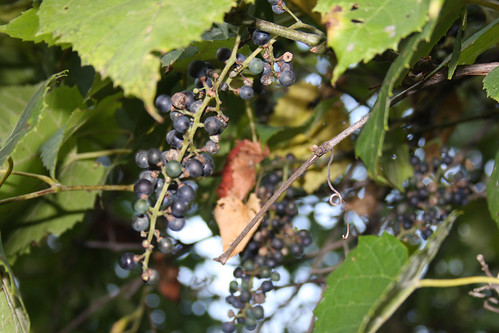
Frost grape, Vitis vulpina. Wild Kentucky grapes.
(*photo credit)
September 13, 2013 Grapes Offer Us Fruitful Potential
We strive not to repeat Daily Reflections; however, the treatment of grapes a year ago today did not do justice to this fruit-filled subject. Further reflections are:
1. Annual variations -- Last year a freak warm period in mid-winter allowed grapes to leaf and little clusters to start and then these froze in an April cold spell; this year the vines are overly abundant and hanging heavy with grapes, but needed protection from our multitude of grape-hungry birds.
2. Broad growing areas -- Grapes are of numerous varieties and species but also thrive in a variety of temperature, soil, and climatic conditions, depending on type grown. On every inhabited continent vineyards yield variety in quality; tastes may differ widely from year to year and one area to another.
3. Unique to regions -- Grapes are sometimes named for the territory in which they grow best (Bordeaux, Burgundy, Alsace, etc.). In southeastern U.S. we find a variety of wild grapes -- Fox, Frost, Muscadine, Riverbank, Rock and others as well as European grapes in an assortment of variations and hybrids. My Grandfather came from France to grow grapes in what was regarded as America's finest wine country (Ohio Valley areas of Kentucky), but a major blight about 1880 forced him to divert to other farming.
4. Grape-growing opportunities -- Growing grapes takes special skills of which some people are more adept than others. Viticulture offers employment opportunities for people with limited land resource and a willingness to work. The grapes take intensive work in manuring, weeding, trimming, picking, and processing.
5. Wild grape celebration -- The glory of wild grapes is that these give consistent plentiful yields with no attention to maintenance at all. The Fox grape and other wild grapes are constant delights and well worth celebration, but do not always make good tasting wine.
6. Rich in symbolism -- Grapes stand for annual bounty, fertility, plentitude of gifts, joy of heart, natural wealth, hidden allurement to enjoyment or over-indulgence, regular celebration, divine graciousness, and general prosperity. In negative ways, grapes of wrath (Book of Revelation) are the fruit of bitterness as also in The Grapes of Wrath by John Steinbeck.
7. Culinary possibilities -- We see grapes as a fruit from which many things can be prepared besides wine (10/5/09; 9/1/11) and several varieties mentioned last year. However, the flavorful taste of grapes carries over into a host of food preparations, perhaps more than any other fruit. Besides mentioned jellies, vinegars, and soft drinks -- one can add fresh grape, juice, concentrate or dried raisins to jams, marmalade, rolls, breads, pies, candies, juices, omelettes, cobblers, cakes, ices, and ice creams, and they can be enjoyed fresh off the vine.
Prayer: Lord, you directed your people to a land of plentiful grapes, a fruit of divine celebration. Help us to know the good fruits you give and use these to improve our broken world and to share joyfully with others.
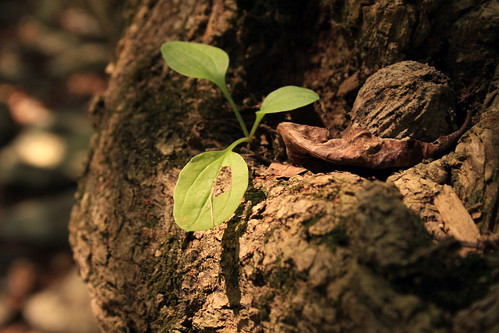
Nurse tree for new growth.
(*photo credit)
September 14, 2013 The Holy Cross: Power and Powerlessness
The Feast of the Holy Cross is a perfect opportunity to probe into the mystery of the ignominy of the cross, and what the Lord's ordeal means for our redemption. The Cross is more that a symbol that Christians embrace and others find odious -- as was the practice of crucifixion in ancient Roman times. The Cross can become more than a religious identifying symbol; it is a key to who we are as Christians and how we engage in life.
Jesus emptied himself of power. Jesus Christ became one of us, taking on the weakness of an infant in poverty and accepting the limitations of human being in all but sin. In becoming powerless, Jesus joins us in our human state and as a united people who grow spiritually through the helping hand of God. Out of love for us, Jesus submitted to a death of the most bitter punishment of crucifixion. As Christians we believe that this dying is coupled with his resurrection and new life -- a divinely transformed Lord in power (Roman 1:4) who empowers us as well.
Powerlessness is part of our condition. As Job says, Naked I came forth from my mother's womb, and naked I shall go back again. (Job 1:21). For a brief period in life we seem empowered to undertake our journey of faith. Through this time of stress and troubles we need God's continued assistance. That condition of vulnerability exists on broader than individual levels, for we cannot overcome the deterioration of social and economic systems without spiritual insight and help. These economic/political systems rise, flourish, and fall and cannot overcome inherent weaknesses without spiritual revival and growth.
Power begins by accepting our cross. Mere acknowledgment of our condition is the very turning point in the journey. To acknowledge the need for power is in some mysterious way empowering. The grace of Christ's resurrection is now at work in the world and moves us to go beyond a state of paralysis in our troubled and quarrelsome world. New life demands accepting our crosses joyfully. Even sincere non-believers must reach out and accept their crosses whether or not called by such a name. The outreach of the Lord's cross is cosmic and transcends time; it is symbolized by a crucifix as embracing today's suffering people.
Acceptance is openness to power; accepting new life is empowering. Many are expected to accept their crosses and to grow in the virtue of patience. But there is more in store. At the moment we die to ourselves and accept God's hand outstretched in our world, we abandon the idols of our own supposed power and the material things we find so comfortable. Being willing to be emptied opens us to acceptance of a Higher Power at work in our hearts and entire being. It is the empowerment of new life that ex-addicts find in moments of greatest weakness and need.
Prayer: Lord, help us to understand our current condition and to put our trust in you to perceive new life springing forth.
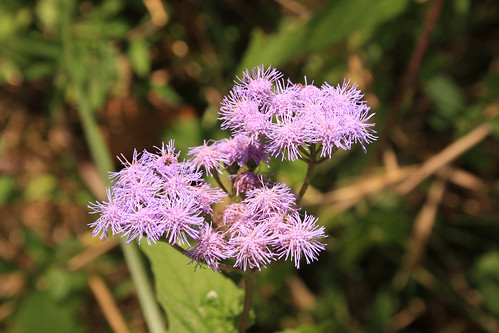
Blue mistflower, Conoclinium coelestinum.
(*photo credit)
September 15, 2013 Celebrate the Prodigal Druggie's Return
But it is only right that we should celebrate and rejoice, because your brother here was dead and has come to life; he was lost and is found. (Luke 15:32)
Rejoicing in a discovery is a human experience we have whether the matter is of monetary or sentimental value. However, far greater is the happiness that can occur when someone who had entered a drug culture and abandoned family, community, and church now returns and is active again. While forgiveness is at the heart of the Prodigal Son Parable, it is more than just forgiving; it is rejoicing in the return and the bringing back to life of the person who was lost. It is the resurrection theme that is not just at the end of life, but occurs with each renewal of spiritual life.
Forgiving another opens the door to an act of restoration of life. A drug addict who comes clean or someone who has abandoned the Church and returns is worthy of celebration and happiness. The prodigal may experience the uncomfortable circumstance of approaching others who apparently live on the straight and narrow path. The wayward fear a judgmental host community just as the prodigal did not know what to expect on his return home. Actually, in most cases the home community welcomes the returnee and sponsors a genuine celebration. It is important that celebration accompanies forgiveness and completes the grand return.
Drugs are an immersed culture that surrounds us. The ubiquitous nature of legal and illegal drugs of all sorts through advertising and easy access make this a more challenging situation in our modern world. Stress, unemployment, even peer pressure opens the door to a pervasive drug culture that, once entered, is hard to break and leave. The user seeks comfort on a purely material level and this can be detrimental to self and family. Yes, no one should over indulge in drugs whether legitimate or otherwise. However, permissiveness in our culture makes breaking drug dependency all the harder, along with an over-emphasized sense of private individualism allowing all to do whatever they want.
Believers in the resurrection strive to break the hold and with open arms encourage those wishing to come clean. An ex-addict is a person of courage and forgiveness opens the door to a loving welcome. Creating a drug-free sub-culture is not easy, for boundaries are so fluid and opportunities to reenter the culture are numerous. This is all the more reason to extend community and individual support to the ones who desire to be drug free. We help create a drug-free space where genuine celebration may occur. It takes effort to break the addiction, and effort to remain clean -- and our welcome makes a difference. Furthermore, community social organizations working to overcome addiction deserve our support.
Prayer: Lord, give us the grace to forgive those who have gone astray. Help us be watchful for opportunities to encourage drug
users to return to their community and the practice of faith.
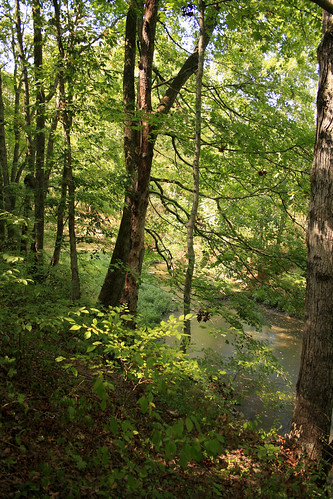
Autumn's approach in rural Kentucky.
(*photo credit)
September 16, 2013 How about Domestic Tar Sands Development?
Certain environmental temptations continue to crop up all around us. Wherever there is a buck to be made, someone out there tries once more to ignore environmental costs that will saddle future generations. How about tar sands? See June 19, 2007.
Canada's Alberta Province (June 12, 2013) contains a major portion of the world's discovered and exploitable tar sands, which hold an estimated 175 billion barrels of crude oil -- making Canada second only to Saudi Arabia in known and proven oil reserves. This "black gold" is locked in sands at various depths of soil. Tar sands extraction is energy intensive and thus climate-change-causing carbon dioxide is emitted in oil production and use. In surface mining operations tree cover is lost; water is needed (2 to 4.5 barrels per barrel of oil) with waste water contaminating pristine rivers and lakes. And then after piping to distant places, oil burning causes further pollution.
Now the urge is to surface far smaller but still sizeable tar sands deposits in Morgan County in Kentucky, for these deposits have been known for some time. The potential developer promises that less damaging methods will be utilized as he projects production of 1,000 barrels of oil a day. He assures us that the company will use better methods than Alberta extraction processes; the sand residue will be returned where found. Hot dogs! However, the environmentally concerned seek further answers to questions before domestic production commences:
* Does surface mining of tar sands fit under regulations governing extraction of coal at federal and state levels?
* Is this a single operation or the beginning of a major extraction of Kentucky and Midwest tar sands?
* Is the community sufficiently alerted as to this form of surface mining, and have local residents had an opportunity to make comments?
* Are there any air pollution problems from the extraction or the transportation of extracted oil?
* Has a sufficient reclamation plan been proposed and made available for public comment?
* Is waste water disposal according to accepted guidelines? * Will local water aquifers be affected in any way?
* What is meant that less contaminating and more natural chemicals are to be used in the process, and is this a comparison to fracked natural gas or oil use of extracting chemicals?
* Shouldn't attention be given to renewable energy sources such as wind and solar instead of those with carbon dioxide emissions and climate change potential by burning tar sands oil?
* Doesn't the process require more fossil fuel in extracting than the use of pumping of liquid petroleum in traditional oil fields?
Prayer: Lord, keep us alert to development that damages our
planet Earth, and give us courage to speak publicly on such issues.
<
Interdependency of stump and mushroom: Lycoperdon pyriforme.
(*photo credit)
September 17, 2013 What Constitutes Citizenship in 2013?
On Citizenship Day we recall that on this day in 1787, delegates to the federal Constitutional Convention endorsed the final form of the Constitution as prepared by Governor Morris, though it still required nine states for ratification. The document was sent to the states on September 28th and the ninth state, New Hampshire, signed on June 21, 1788; thus the Constitution was adopted and remains the oldest such document currently operative on this planet.
The elements of citizenship mentioned in a previous Daily Reflections (9/17/07) are numerous. Citizens are members of the United States by birth or naturalization and bear responsibility along with a privilege that are enhanced through listed duties: voting in elections; serving on juries of our peers; assisting others to citizenship; monitoring elected officials; looking out for the commons as citizen monitors; defending our democratic way of life; paying fair taxes; volunteering when needed, especially during emergencies; exercising civility and respect for others; obeying just rules and laws; knowing the history of our country; respecting those fallen in defense of our country; and embracing global citizenship and a New Heaven and New Earth.
Over the years, these other acts of citizenship are also worth mentioning:
* Defending the right to life in all its manifestations, from conception to death as well as the vitality of Earth herself in this time of climate change and its catastrophic consequences;
* Conserving natural resources through energy efficiency, curbing of fossil fuel expenditure, and moving rapidly to renewable energy applications;
* Seeking adequate food supplies and potable water;
* Giving citizenship without impossible conditions to those who have proved law-abiding and responsible migrants in residence;
* Expecting proper educational and recreational facilities on par with others in our country;
* Proclaiming the right to proper health facilities and care;
* Confronting those who through privilege and influence have subverted our democracy by obtaining and retaining an unfair amount of natural and financial resources;
* Reclaiming the commons through effective actions that are non-violent in character -- especially levying taxes on all in proportion to their wealth and ability to pay;
* Demanding the right to employment and a government as employer of last resort, and expecting work from all able-bodied;
* Perceiving the right to bear arms as a collective right under a well regulated militia, and not as some selfish individual right to any sort of firearms or ammunition;
* Insisting on a smoke-free and arms-free environment; and
* Respecting silent space in localities.
Prayer: Lord, help us to know how to be good citizens and inspire all citizens to act accordingly.
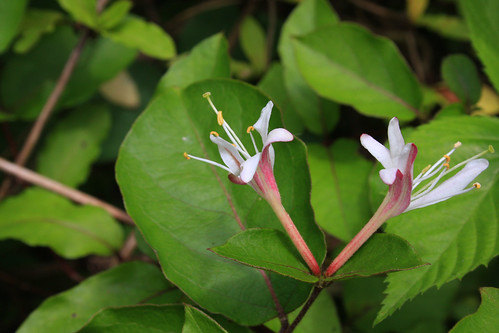
Lovely exotic species, Japanese honeysuckle, in Kentucky.
(*photo credit)
September 18, 2013 Window of Opportunity to Save Our Wounded Earth
On World Water Monitoring Day we could speak about water problems facing our citizens in pollution, shortages of drinking water, and lack of proper water treatment. The trouble is water, though related to serious issues, is not THE major one, namely the more extensive climate change issue. However, this impinges on water levels (ocean rises), weather disasters (floods and droughts), lack of water supplies through glacier melting, and water quality deterioration.
A pessimist says that greenhouse gases rose again in 2012 by 1.4% and on schedule for a horrifying 5.3 Celsius rise by the end of the century (catastrophic) -- and this group is growing rapidly.
An optimist says that these predictions by the International Energy Agency are overblown, that global warming is not humanly-caused, or that something unexpected will change things -- but this group is shrinking rapidly. A realist seeks the few remaining windows of opportunity that urgently needs addressing.
Saving our world means today cooperating in the work of the Lord and that means embracing spiritual and physical savings. This is a new phenomenon that others in previous generations never had to cope with in their lifetime. We are uncertain as to whether we can succeed, but we must hope for the good of all that something meaningful can be achieved. That is why we must redo the book The Contrasumers on its fortieth anniversary next year.
Physical measures must be implemented. Instead of focusing on a multitude of small individual activities that have some impact on consciousness raising, we must concentrate on broader and more proven long-term strategies. In actuality, we must introduce public energy efficiency measures, cut fossil fuel consumption in all measures (coal, petroleum, and methane consumption), and replace fossil fuel consumption subsidies by renewable energy ones (solar, wind, geothermal, hydropower, tidal, and others). If these three areas of efficiency, curbing fossil fuel, and replacement with renewables were undertaken in a meaningful fashion in the next few years, we could still save our wounded Earth. But in themselves physical measures will be insufficient due to our addiction to resource consumption.
Spiritual measures must be implemented. Secularists often ignore the spiritual dimension of our current needs. Believers must stand up and embrace a resurrection-centered spirituality that calls for the renewal of heart and soul. As a culture we are socially addicted consumers who must acknowledge collective misdeeds. Thereupon reparation must be made by the believing community that is empowered by the resurrection to bring about change. A few spiritually inclined and inspired can save our wounded Earth provided we are free to function openly.
Prayer: Lord, help us to see that all must acknowledge faults
and believers must make reparation for the salvation of the world.

Purple passionflower, Passiflora incarnata.
(*photo credit)
September 19, 2013 The Church Proclaiming Good News
He has sent me to bring the Good News to the Poor.
(Luke 4:18)
We are faced with the need to spread Good News, especially in this year of faith. Nonetheless, we have the paradox that we are watching the window of opportunity closing to save our world from catastrophe (see yesterday's "Daily Reflection"). We certainly do not have to be overly optimistic when viewing the actual situation and pretend that environmental conditions are NOT humanly caused. Nor do we have to be overly pessimistic as though the causes are beyond human change and all we can do is patiently allow the world to go to pot as we strive to save our precious necks.
------------------------------
The Church teaches us that past generations deserve appreciation; future generations deserve consideration; both groups orient us to be good proclaimers of Good News. We must be informed as to history; we must affirm a hope-filled future. We cannot walk backward favoring a return to a rigid past tradition; we cannot become so futuristic that we lose contact with current human need. The Church is the messenger of Good News with new forms of communications to help carry out this mission. Information overload can fill our minds with problems that can distract us from our mission. Devices are susceptible to scams, chatter, and shallow information can divert our attention. Cautions are necessary, but busy highways have both peril and promise.
Action 1 -- Embrace the communications revolution. This is an opportune time to spread the Good News for we are able to communicate with people more easily through Internet and cell phone. We touch those in distant lands frequently and with ease, and at relative low costs. All levels of Church organization are challenged. Some give individual encouragement and counseling via Facebook or Email; other bodies teach via Internet courses and give physical assistance when disaster strikes. As communication becomes instant, varied, and far-reaching, the time between disorder and global assistance shortens. Good News cannot delay.
Action 2 -- Remain critical of shallow communications.
The airwaves are filled with bad news from many sources. Being critical means to a limited degree that the Church must be critical of itself and what holds it back from proclaiming Good News. Confess wrongs, recognize and show gratitude for forgiveness, and accept the hand of God at work in what we strive to do. The Church has much to give a hungry but improperly overly sated world filled with junk information. Truth needs to be told with courage.
--------------------------------
From Reclaiming the Commons, Chapter Six
Prayer: Lord, we are sent to proclaim Good News and that means that with prayer and hard work we can save our wounded Earth -- but we can not tarry.
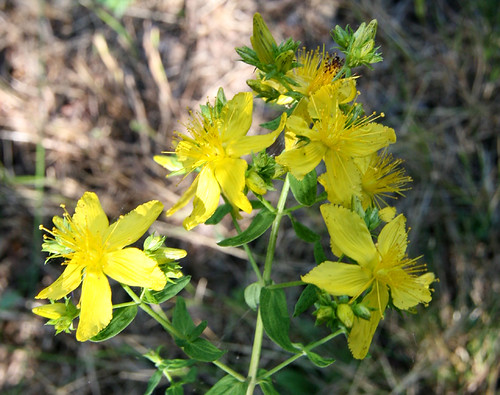
Burst of autumn color: common St. Johnswort, Hypericum perforatum.
(*photo credit)
September 20, 2013 Aquaculture and Modern Fish Farming
The world's fish stocks are being depleted, mainly through highly efficient commercial factory-fishing methods that can strip the oceans of desired stocks along with other marine life. One method of returning balance is through global regulations against such fishing, but some nations are remiss at enforcing global recommended practices in fishing and whaling. Aquaculture is a substitute to furnish needed fish protein for a hungry world.
Aquaculture (or aquiculture) is the managing of marine plant or animal life for commercial purposes. For centuries a successful fishing alternative has been to farm fish stock just as farming for meat by raising cattle. We cannot expect bush meat (wildlife) to furnish human protein needs, and have for millennia resorted to livestock-raising; the same need for aquaculture arises today.
Fish farming benefits include the following: a livelihood for people who want to farm on smaller amounts of land and yield a high return per acre; a steady supply of protein at reasonably low cost for people highly impacted by loss of traditional fishing grounds and stock; less resource impact than farming with free-ranging or confined commercial cattle and hog operations (and less potential pollution); and promising opportunities to turn marginal land into ponds for fish production. Aquaculture requires skills and maintenance more than throwing in lines and drawing out fish.
Aquacultural problems arise as expected, for no development is totally free of problems. However, research shows that with proper growth of plants as companion to fish, the waste of one class becomes the nourishment of another -- similar to keeping fish tanks healthy. Current Canadian research/commercial operations show seaweed grown on fish farming wastes has food value as a source of its own protein for a hungry world. Small fish farming operations do not pose problems, and use of artificial or natural water bodies has productive potential and can be a green practice.
Critical commercial issues arise with large-scale fish farming, just as with factory ships depleting ocean fish stock. As fish farms multiply in number and size due to growing demand (currently over half of fish are obtained by farming methods), efforts must be made to keep production within bounds. Caged fish farms in natural water bodies emerge with a set of problems as well. Large concentrations of specific types of fish (e.g., salmon) result in diseases that can spread and to possible escape from hybrid species into the ocean stock. Reduction of factory fishing allows return of income to small-time ocean fishers. No aquacultural problem is insoluble for one cannot expect that the world will go back to near total dependence on catching wild stock to satisfy fish demands. Aquaculture and ocean fishing can and must be harmonized.
Prayer: Lord, teach us to fish in balanced ways so all can be
satisfied at the modern multiplication of loaves and fish.

Migration of cedar waxwings.
(*Photo by Mollie Roosevelt, Creative Commons)
September 21, 2013 Listen for September's Distinctive Sounds
Much is made of the sights of the seasons in these Daily Reflections and elsewhere. However, seasons also have distinctive sounds, though autumn's may be less pronounced than those of icy winter conditions or spring's mating season. A perceptively blind Rip Van Winkle could awaken and still know the season from sounds alone. It may be falling and drifting leaves, breeze in partly clothed trees, shouting at football games, buzz of yellow jackets, and rustling of scurrying varmints preparing for winter.
Perhaps the most distinctive autumn sound is that of flocking birds that tend to come rapidly, make an immense chatter, and leave like a gush of wind or what we would call the "warning breeze" before the storm. Many of the birds-of-a-feather do flock together and these are exciting to observe. In fact, I have only one funeral wish and that is that a flock of birds would form an escort. Their presence is always most welcome.
The following is an excerpt from Appalachian Sensations --
----------------------
September -- Autumn's First Signs: Flocking birds
Like a bird flying through the air --
leaving no proof of its passing;
it whips the light air
with the stroke of its pinions,
tears it apart in its whirring rush,
drives its way onward with sweeping wings,
and afterwards no sign is seen of its passage.
(Wisdom 5:11)
I go out and hear them congregating
all speaking at the same time -- winter comes
maybe so, maybe so.
How am I to interpret their animated chatter?
They fly within the leafed tree in a flutter;
just as abruptly they depart for another;
Is it the stress of impending seasonal change,
or induced excitement of sheer number?
When they pass over as a noisy flock,
I shield my eyes for fear
their droppings might miss the free space
and hit me right between my eyes.
----------------------
Prayer: Lord, give us the grace to hear the sounds of the seasons and to rejoice with each new sound and season. Allow us to know when autumn appears that a distant trumpet calls us home.

Trees, bending from winds.
(*photo credit)
September 22, 2013 Master the Art of Servanthood
Listen to this, you who trample on the needy and try to suppress the poor people of the country. (Amos 8:5)
Amos awakens us from our slumbers and our permissiveness of a culture that entices the poor and sets their eyes on winning a lottery of which only a tiny fraction will be fortunate. Too often a way of pacifying the poor is through such enticements, along with just enough to continue scratching for a living. We must dissuade the poor who think it takes too much time to revolt and claim what is rightfully "ours collectively." Haunting questions: must we persuade others to be masters of this world? How can they do this in a non-violent manner? Does the risk of successful taking turn them into imitators of the affluent and oppressive masters?
Serve the Divine Master. We cannot serve both God and the worldly as Jesus tells us. To serve only God requires us to master our tendency to the world's allurement, and this "mastery" of the art of service requires spiritual growth. Amazingly, we are called to acknowledge a master and to be a master over ourselves. In so doing we enter into the life of the divine Master and abandon the path of the worldly that stands out all around us. No matter how hard we try, we still find such mastery difficult because worldly culture entices us through TV, billboards, and social media.
Master ourselves. How are we to become master of our conduct in this world? We can turn off the TV or limit ourselves to social media times and places. We can reflect on how powerful these allurements are to us and especially to the younger generation. If we are to be truly masters of ourselves we must be willing to say NO to the informational overload that tends to overwhelm us and occupy all of our attention. It is like attempting to see a flood of displays at a world fair but to do this daily during every waking hour. If we give in to random bits of time given to each item and hurry from one to another, we become steeped in worldliness; we forget the length of time it takes for prayer and service to and for others.
Help others to master themselves. The goal is not to be masters over others, but to encourage them to master themselves so that we can work as partners for a better world. We pray for all to break the barriers that immerse them in the world. We take creative steps to frustrate a world of allurements by not taking seriously billboards and advertisements that attract folks. When we find people who are regarding these worldly allurements seriously, we can confront them, question them, and challenge them for the short time we can hold their attention. Are there ways to hold their attention at least for awhile? Success is fleeting, but just might come when we least expect it if we trust in God.
Prayer: Lord, give us the grace to become defenders of the poor and the ones who master the gift of giving what is needed for all to follow for making a better world.

Last of summer morning glories.
(*photo credit)
September 23, 2013 Preparing Buildings in Autumn
Yesterday we celebrated the Autumnal Equinox and a new and cooler season is before us. It's time to inspect our homes, offices, and grounds to determine what can be done as summer fades and frost is coming. Here are some hints, besides including some on gardening that we have discussed in previous Daily Reflections.
* Caulking time means inspecting the house and any structure that will be heated for cracks and leaks. It takes a little time and a little more investment in higher quality caulk.
* Insulation is a major investment but it reduces heating bills. In fact, there are few more economic investments. We are insulating under my residence for the coming winter and while expensive it will have an estimated payback of one decade.
* Weather strips are something that are also worth doing, especially for doors that can be quite leaky if left unattended.
* Window inspection includes ensuring that storm windows are properly fixed and insulation added where needed.
* Food supplies (up to a week) are needed for any emergency. Inspect the store and remove and replace dated materials. Stock up on canned and dried goods as well as jerky and other items you may desire to tide through a snow-bound period -- though that is less likely in current climate change weather.
* Car checks are important for the coming months and an early inspection is well worth the time (for tires, wind shield wipers, and winterized engine fluids).
* Winter equipment includes snow shovels, proper winter wear and boots, and deicing materials. Are they sufficient and in good repair?
* Domestic lighting/heating units include flashlights and batteries, candles, a safe space heater where needed, and a solar powered radio for emergency situations.
* Elderly care means that all seniors who live alone ought to have a buddy system and plans in place in case of emergencies, for the care of neighbors is a priority for the health of the community. Mobile home dwellers ought to be encouraged to participate in energy conservation measures including closing off unused space in winter periods.
* Emergency communications are worth an inspection for self and those with whom you buddy. Are 911 units and emergency radio/phone announcing systems in good order?
* Fuel wood supplies are important for those who have wood-burning space heating systems. Check chimneys annually. Think of doing this now before the rush is on when the weather gets decidedly cooler.
* Entertainment possibilities include books and games in case of being homebound and needing something for spare time.
* Greenhouse preparation is worth activating as well as outdoor coldframes and extension to year-round garden projects.
* Winter clothes are examined and, where needed, refurnished.
Prayer: Lord make us people who are prepared for the coming season and always prepared along life's journey.

Blue-eyed grass, Sisyrinchium angustifolium.
(*photo credit)
September 24, 2013 Environmental Gun Threats (EGT)
In our growing consciousness about the need for gun control something is emerging that is not strictly new but has not been clearly defined, namely, the overall threat to peace-loving people by the actual presence of guns in our communities. These can create a suspicious atmosphere that can be toxic. Guns within homes or carried by another, or the potential danger signaled by rapid loud gun reports on occasions gives rise to mental and emotional disturbance. Just as environmental tobacco smoke gave rise to the general public's activism to eliminate smoking due to spill over to non-smokers, so presence of a national arsenal dispersed out to all sound and crazies, leads to basic insecurity and environmental risks to mental and emotional health. Ironically, gun "security" precipitates insecurity -- the premise of our upcoming GUNS: Giving Us Negative Security (Brassica Books, 2014).
If a community is aware of military weapons in hands of mentally disturbed individuals, that insecurity spreads to more and more citizens. What happens if a person wielding a weapon comes to your door and pushes the gun in your face? This question was posed by a gun owner who challenges the basic premises of this upcoming book. Kentucky is a very red state where guns are in well over half of the homes. My initial response is that I have outlived average white males by several years and continued mortal life is somewhat like "gravy," an extended gift that is perhaps more expendable than people with family obligations. This answer overlooks the divine gift of longer life that deserves respect.
Our entire national "neighborhood" is threatened by the mental unsettling condition of having 300,000,000 uncontrolled guns. This is environmental gun threat (EGT). As a nation we are being bullied and are too embarrassed to speak of it. When Colorado's gun laws were enacted in March, 2013, the concurrent assassination of the state's director of public safety pointed to the risk of being public in gun-related matters. Assassins are moved to respond to threats to their supposed right to current practice by removing the threat. Sending letters laced with ricin to Mayor Bloomberg or President Obama has the same effect. Infringing on "gun rights" arouses deep and unpredictable emotions.
We are aware that massacres occur and await the next shoe to drop at any time. Murder during incidents of domestic violence is a national phenomenon that affects all in a neighborhood -- and studies are now occurring in social psychology and mental health circles. We are told that mental health is affected by real threats in a community and this has a scientific basis. Domestic gun violence affects mental health and it is far less messy to kill another with a gun than by stabbing or bludgeoning with knives or clubs. However, the end result of use of any weapon in a lethally meaningful manner is horror -- and all must be avoided if possible.
Prayer: Lord, give us the compassion to think seriously about
community health when it comes to presence of guns.
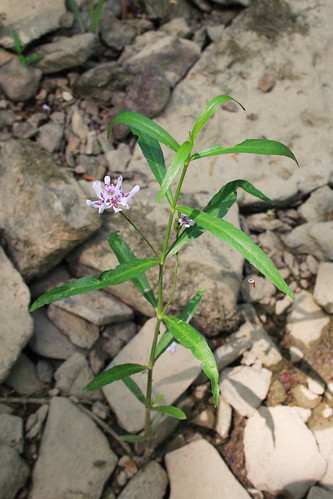
Water willow in September. Justicia americana.
(*photo credit)
September 25, 2013 Global Disaster Early Warning Systems
Disasters often occur when and/or where least expected. However, remote and proximate preparations can alleviate the suffering. The presence of modern communications and the information revolution can go a long way in both remote and proximate forecasting of coming disasters. Certainly our American as well as other national systems are needed for warning citizens. Global alerts help all people and American interests abroad such as military and diplomatic personnel, travelers, students, and residents abroad and U.S. territories (Guam, Pacific Islands). Let's remember that disaster warning of Americans warns the world.
Today, hurricane warnings can be given well in advance, though exact paths may not be determined precisely. Current weather forecasts are far more accurate than those of a century ago, mainly through use of modern information-gathering orbiting satellites. Predicting upcoming hurricanes, tornado events, and flooding conditions have a higher degree of accuracy than some other classes of disasters. Volcanoes can be anticipated to some degree with increasing accuracy. Earthquakes are hard to forecast in advance, though the likelihood of a destructive tsunami can be communicated to possible target areas instantly; an international tsunami alert system is being established and could have saved many of the 200,000 Indonesians and others who died in the December 2004 tragic event. However, many of the 30,000 Japanese who died in March 2011 had too little lead time to escape.
Discussing warning systems may help encourage residents to build tornado-proof shelters, to improve building designs in earthquake-prone regions, and to monitor possible volcanic disturbances. Furthermore, serious weather events are projected to be of greater frequency with modern climate change conditions. If each reader would take or encourage others to take longer-range precautions, human harm could be reduced to some degree. What if the Oklahoma school system had tornado-proof shelters this past spring? However, while we may take measures to curb climate change and subsequent weather-related events, we cannot halt natural disasters -- but we may be more able to get out of their way.
Richer counties do and should continue to cooperate on warning systems. Just as we in Appalachia have radio-activated warnings in case of unusual weather events, so such systems could be globalized because of the vast increase in cell phone systems in all continents. Communications costs are relatively small compared to the potential damage resulting from a disaster with no or little forewarning. Better than implementing some sort of global tax is to internationalize existing warning systems and to persuade reluctant nations to come on board as a benefit to all. While this is a global concern, the U.S. must act, even unilaterally, for all.
Prayer: Lord, inspire leaders in wealthier lands to see the wisdom in developing early warning systems, and sharing these with
the world community of nations for the benefit of all.

Quiet spot for nature observation.
(*photo credit)
September 26, 2013 Occasionally Returning to the Home Country
I am returning refreshed from a rare trip to my grandparents' native land, Alsace. This trip was undertaken with my sibling brothers as part of my 80th birthday and promises to be a memorable family experience. Some may argue that the author of Contrasumers should not undertake such jet fuel costs. I do not deny or minimize energy expenditure when needed, and even argue for the relative "necessity" of this trip for personal family relations, both here and in France, and for economic health of travel services and employees. In September we focus on Chapter Six of Reclaiming the Commons and point to our very real communications commons.
Occasionally, we ought to travel and reestablish roots with our more distant home. We say rarely, for over-mobility is not good for any of us -- though some occupations demand extensive travel. This month we are talking about educational and intellectual advancement and often moderate travel allows us to solidify personal growth and the global community's good. Our minds are broadened; our hearts extended. A globalization where at choice times we connect personally is a necessary bonding that only face-to-face contact achieves -- and with some hidden economies.
Travel back home is good for the soul, giving it some spirit to extend greetings to others we do not often see. Spreading Good News can be done by communication over the Internet and phone systems, but also in special ways through personal contacts. On occasions the world needs that I go out of my shell and interact with others. A rare religious pilgrimage or educational program is justified; so are social and emotional aspects of returning to one's roots and reestablishing contacts. This is especially true while health permits and we can say farewells to living relatives.
Reconnecting with family is good for hosts as well, for the chance to meet and greet and interact builds the social bonds of kinship so needed in our distracted world. My French cousins (many of my grandfather's sibling offspring) would like to see us and give a final blessing. Furthermore, these relatives speak Alsatian, an endangered language valued by those of us wanting to save and record our precious past. The assurance that distant folks are valued enhances a web of love holding our world together.
Cultural tourism is worthwhile allowing satisfactory jobs and demanding the talents of skilled and trained individuals. This service industry takes lower amounts of energy per job than many others. Service people are locally employed in guiding, lodging, hospitality, travel, maintenance, and food preparation services. Tourism is a major source of employment in Alsace and especially in the village where my folks originated. In learning how cultural tourism works (see Eco-Tourism in Appalachia) we can improve our Appalachian economy and invite ex-Appalachian retirees to return.
Prayers: Lord, give us the joy of coming home, for if we
experience it in this life we can do so in the next as well.

Trio featuring the sweetgum tree, Liquidambar styraciflua.
(*photo credit)
September 27, 2013 Touching and Celebrating Earth through Dancing
On Native American Day we honor people who love to dance or encourage the more energetic ones to express joy through dancing. Many cultures of the world celebrate in this manner and we look a little deeper and find that they are in rhythm with the vibrations of Earth herself. No, Earth is not firmly concretized and devoid of movement; rather is it full of life and we show at times that we are one in harmony with Earth's vibrations. Thus the practice and art of dancing is one of being in communion with the heartbeats of our planet -- and celebrating with others who experience the vibrations. The joy of dancing is that we all agree with the exuberance of those who express themselves in bodily movement.
At special occasions this celebration occurs in our region and is captured in words and photography as now available in Appalachian Sensations: A Journey through the Seasons together with photographs of Warren and Pat Brunner.
-----------------------
September -- Dancing with the Hills
Why skip like rams you mountains,
why like lambs you hills? (Psalm 114:6)
How could people discourage dancing in the name of religion, when the Scriptures are filled with this expression of joy? Didn't David dance and sing? Were not the people returning to Jerusalem expressing their feelings through sacred dance? And aren't the Scriptures replete with "natural theology"? Don't those seemingly ever-solid mountains and hills express joy through movement, or at least vibrate so subtly that we have to be in tune to feel it? Are we too leaden-footed, stone-deaf, and hard-hearted to experience the feeling of land and people when they get together and celebrate?
In this land of plenty we have much to dance about at harvest time. By expressing these feelings of joy we praise our loving God. We speak, we shout, we sing, and we dance. We can become glum for many reasons. There are a multitude of grander reasons why we ought to be happy and to skip like the hills. The waning away of summer might be the perfect time to start again. Let's be on the lookout for the right festival, fair, feast, or other harvest celebration.
-----------------------------------
Prayer: Lord, give us the joy that you manifest in all creation; help us to glorify you by enjoying the greatness of what you have done in our midst. Let us continue to express this joy in many ways such as in word, photos, conversing, singing, and dancing.

Burst of gold in early autumn.
(*photo credit)
September 28, 2013 Why Not Consider a Recorded Funeral Oration?
How about this as a touchy subject: create your own funeral oration? Are these good enough reasons: No burden on others to compose some half-truths? A final chance to insert a word on favorite issues? A way to keep attendees awake? A last ability to control an important personal event? You, not I, will decide whether this will occur. Am I not at your mercy?
Isn't wisdom knowing the shortness of life, age the shortness of breath, and charity the shortness of a homily? Whether rainy, snowy, foggy, or sunny, isn't it best to demonstrate all three today? Why no statements, no should dos, no prolonged bully pulpit? Isn't this a better way to get folks to settle down and undergo a "Daily Reflection" for a moment? Does it make sense?
Has not my life been environmental for the greater part, and one with a spiritual connection as well? Then how about spending a little while reflecting on the condition of our wounded Earth that needs healing as said so often? Have we not shared this God- given beautiful planet together and dislike what greed and selfishness has done? How about listening to the gurgling brooks, singing mockingbirds, or chatter of flocking birds? Do you taste the Eucharist and realize Who is really HERE? Do you smell the smoke and pollution of a troubled world and contrast these with flowers and well-cooked food? Will you sense the need to complete many works-in-progress right NOW since urgency is bequeathed to you? Aren't you the ones who say WE and engage together in one grand movement to fill up what is wanting in the suffering of the Lord? Are you to save and renew this endangered planet in ways I cannot fully fathom?
Does the tenuous and incomplete work seem overwhelming? Perhaps, but doesn't it take trust in God, a trust involving everyone? Or is this like Lot haggling at Sodom's being saved by an ever smaller number of the righteous? Didn't it require a minimal number, a believing critical mass to break the social addiction gripping our world? Won't that be sufficient to do the unfinished task that I somewhat reluctantly leave to you to do? Perhaps it ought to be regrets that I take this departure, but really is it? Isn't it the task of another generation when we let go of our grip on problems and leave to them the things we failed to do and for which we beg forgiveness? Yes, and C'est la Vie?
Won't we meet again quite soon, or do you prefer to define soon as "later," some say, "Very much later"? How about looking back and finding that youth was a very short time ago? Isn't time quite soon no matter how many decades? Can you accomplish what some of us attempted and failed to complete? Should each of us try our hand at a final oration, even though it launches an eternal journey of vast expectation? Well at least shouldn't we be upbeat about it and sing a song together?
Prayer: Lord, don't you have the final word on all things?
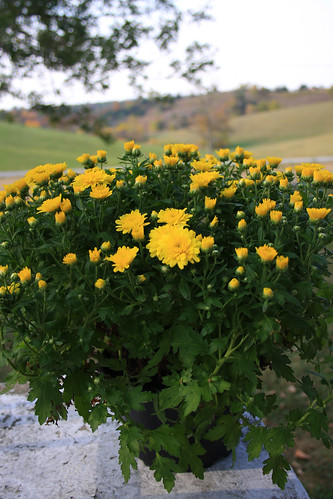
Bouquet of yellow mums with backdrop of Kentucky hills.
(*photo credit)
September 29, 2013 Lazarus Is the Divine Presence in Our Midst
If they will not listen either to Moses or the prophets, they will not be convinced even if someone should rise from the dead.
(Luke 16:31)
Let's get uncomfortable now. Every three years we hear this Parable and sort of wish it would go away, for Lazarus the destitute intrudes on our comfort zone. Is it enough to run out and forget our temporary discomfort, or can we do something meaningful to bring about change? Is it enough to throw pennies at the world's poor? Can we break our own impoverishment when we choose to associate with those who are most in need in our society? "They" may be homeless or homebound, drugged legally or illegally, imprisoned physically or emotionally. We must examine our comfort zones, our sad areas of the mind where we retreat and can't bear to see dogs licking someone's sores. Is Lazarus, Jesus in our midst? To affirm Jesus in the Eucharist is to see Jesus here among the suffering -- a broader sorrow. If we believe that Jesus is present in the bread, he is present in the suffering also.
Let's be willing to share. Many cannot bear the story of Lazarus for it involves distant poor nations to whom we cut charity this year due to budget difficulties. Sad enough, but we are startled to hear that destitute folks are not only those distant; they intermingle in our midst, for distant neighborhoods become very present through communications. "Dives" are ordinary people capable of making changes and sharing plentiful resources with the neglected -- and yet look the other way. We are challenged by Lazarus, the only named person among Christ's parables. Wealth surrounds us; wealth smoothers us; wealth allures us. We have Haiti at our door step, and we have others who are needy within, for even with progress being made, still we have a billion hungry people so close because of the immediacy of modern communications. Are our food wastes alone enough to feed an entire world's hungry? Why acquire and cook what we will not or should not eat?
Let's realize our collective salvation is at stake. If we neglect those who are destitute or highly impoverished, we could lose our soul. That is our individual souls through silence and the sin of omission, and our collective souls as a potentially democratic people overcome by distractions. We become the insensitive ones, the affluent who excuse themselves by overlooking those in need. Individually, Jesus will confront us at the judgment that will come only too soon. But there is more. We are challenged by a collective judgment soon to come as well. We don't know when or under what circumstances, but an outside world haunts us like nineteenth century American Southerners haunted by the radical preacher Nat Turner's 1831 massacre.
.
Prayer: Lord, open our eyes to see that while poverty recedes in many places, still poverty remains, and it is with this persistent poverty that we must focus our attention.

Turning leaves of the poison-ivy plant.
(*photo credit)
September 30, 2013 Present Time: Glancing Back and Looking Ahead
Today I am officially 80. The eight decades have gone quickly and I look ahead to this age of wisdom. In looking back and forward I need to pause and thank God in special ways for being able to live so long and have the privilege to serve others -- though not always perfectly. Our belief in a merciful and forgiving God enhances that depth of thankfulness as does the horizons that stretch up ahead. It's time to bring together the faithful and hopeful moments and discover God's ever present love.
Our past has fashioned us. A birthday harkens back to roots and our springing into life, something beyond memory for our coming to be is not remembered, even though experienced. We reach back in memory to the good people and events that came before this now, and are thankful for parents, their faith, their devotion, their hard work, and their loving provisions for offspring. They believed in a future for us all, a future even after they were gone. Thanks is also due to all who nourished our faith, taught us rudiments of that faith, and introduced us to cultural and scientific treasures. A glance back does not give full credit to people and elements that brought us to this present moment. Our past directed us and fashioned us, but freedom still came into play.
Our future draws us with some degree of anticipation and even trepidation. Hope is an expectation that includes an element of uncertainty, if not about the outcome at least about our role in it. Looking ahead can be regarded by some as futile, when aging means restricted physical activity and expecting a profound change that is inevitable. Hopefully, we await with great expectation and a rather holy impatience what is to come. The horizon actually looms ever greater with time and does not recede unless we still cling to a false retreat into mental canyons with their pleasant but fading memories. We are empowered by our hopes in the future.
Our present is this incident when past and future converge and we welcome them together as friends in a party, not in an overly optimistic or pessimistic manner, but with an atmosphere of realism. We are who we are. Realists know the limitations of the past recede behind us as memories fade and dreams of future horizons as well. Our misdeeds call for God's mercy and forgiveness; our hopes of achieving on this planet recede as well in the fog of our limitations and shortening time span. Realism does not allow us to hold our past as though present and walk backward on life's journey. We face ahead for whatever the future brings with a hidden brightness that we cannot yet distinguish. Mystery foreshadows an infinite road ahead. The present is gauged by the past and marked by the unfulfilled future. Mortal time is short and that is wisdom; that time is ever shortening and that is realism. In God's good grace past fidelity and future hope blends into the eternal presence of Pure Love. Such is the 80th!
Prayer: Lord, give us the grace to know where we are and to allow birthdays to be times of thankfulness and deeper reflection. |

